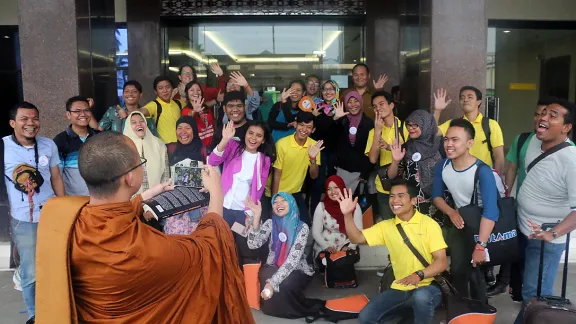
Monk Dhirapunno takes a group photo in front of the conference center in Medan. Photo: A. Yaqin
LWF and Indonesian institute build on a dialogical model to affirm diversity
(LWI) - An interfaith pilot project targeting youth in three cities in Indonesia has become a source of inspiration for young people and is evolving into a platform where they continue to affirm each other’s religious diversity and equality for all in the community.
The Lutheran World Federation (LWF) in partnership with the Indonesian Consortium for Religious Studies (ICRS) has trained young Christians, Muslims, Buddhists, Agnostics and those from local religious beliefs in Medan, Manado and Ambon in the initiative named INGAGE, referring to interfaith engagement. One of the goals of the program was to assess the role of social media in interreligious relations and encourage the trainees and their peers to creatively use communication tools to affirm diversity and equality. At least 25 young people were trained in each of the three locations, adding up to a total of 81. Nearly 400 youth had applied for the training.
Using local trainers, the youth discussed the theme “Communicating creatively on faith and equal rights - Interfaith training for a new generation in Indonesia” during the seven-day intensive training and further exchange over several months. In mixed religious groups they visited a Buddhist center and a Hindu temple; some spent a few days in a Muslim boarding school; participated in a religious tradition house of worship or Parmalin; and shared communal meals among other activities.
The training also included human rights’ literacy and citizens’ right to freedom of religion or belief. The pilot project ended with a public event for a wider audience of representatives from religious communities, scholars and government officials. Its design drew upon the combined expertise of the LWF as an international faith-based organization with a long-standing track-record in advocacy for freedom of religion and belief, and the active civil society engagement of ICRS as an academic interfaith institution. INGAGE was principally funded by the Norwegian Agency for Development Cooperation, NORAD.
The LWF clearly wants to continue to provide space for young people’s encounters on different religions and peace building not only in Indonesia but in other parts of the world.
An interactive ‘kopi toleransi’
After the September 2016 - February 2017 pilot phase, the young people continued to meet. For example, in Medan, they set up an interactive evening called “kopi toleransi” (coffee tolerance), during which they meet for coffee and discuss perspectives on tolerance among different faith communities in a country of multicultural and multi-religious diversity.
“Such concrete actions are encouraging and need to be supported further,” said Rev. Dr Simone Sinn, LWF study secretary for Public Theology and Interreligious Relations, who coordinated INGAGE’s work with ICRS.
“The LWF clearly wants to continue to provide space for young people’s encounters on different religions and peace building not only in Indonesia but in other parts of the world. The goal is to continue working with other interested partners to nurture and provide capacity for youth to be engaged agents of peace in their communities,” she added.
“Often people think that young people have to be ‘guided’ in order to be able to deal with religious diversity. But a much more fruitful approach is a dialogical model where you create a space for young people to express what is dear to their hearts,” noted Dr Leonard C. Epafras, ICRS Yogyakarta coordinator.
Often people think that young people have to be ‘guided’ in order to be able to deal with religious diversity. But a much more fruitful approach is a dialogical model where you create a space for young people to express what is dear to their hearts.
Sinn said plans are underway to also explore whether to work with other LWF member churches living in contexts defined by a plurality of faith and cultures.
There are 13 LWF member churches in Indonesia, bringing together nearly 6 million Christians.


